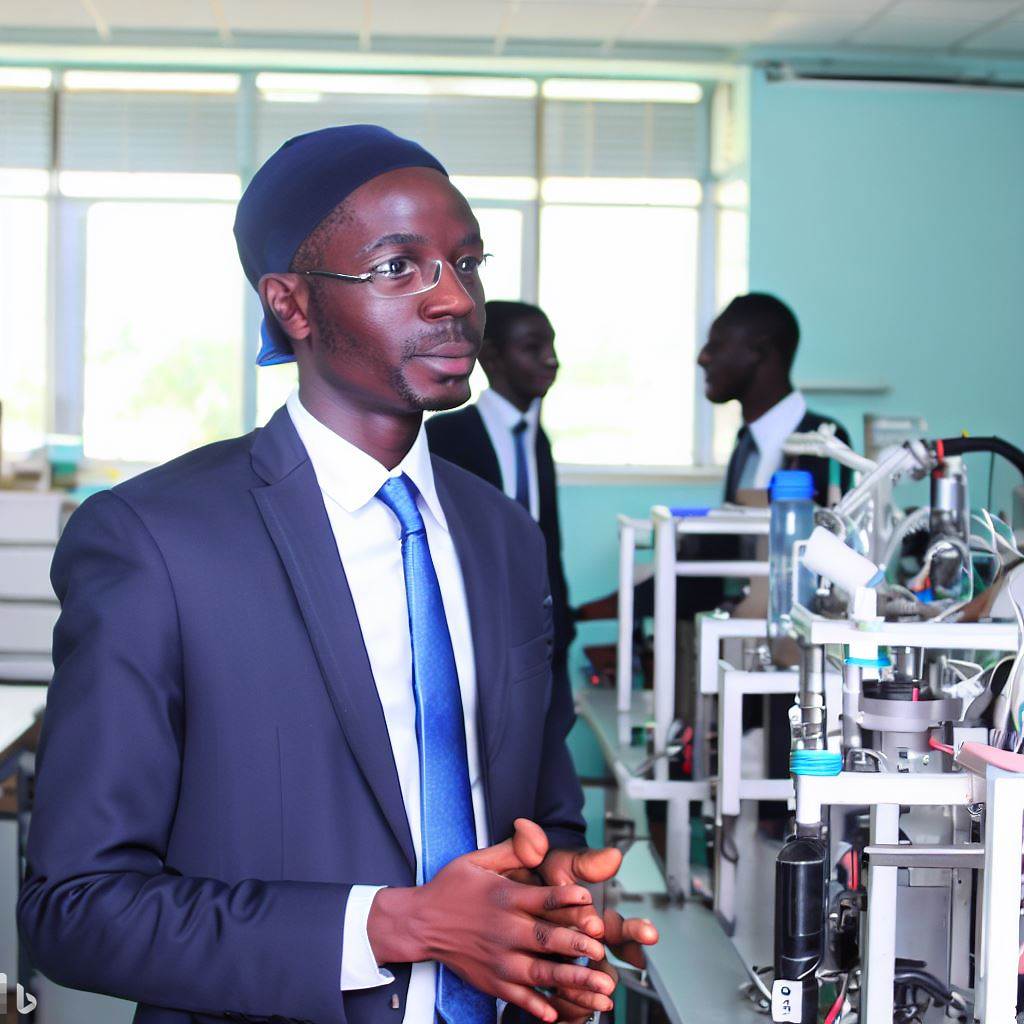Introduction
The future of Biomedical Engineering in Nigeria holds immense promise as it harmoniously blends biology, medicine, and engineering.
This discipline plays a pivotal role in propelling healthcare advancements, enhancing medical apparatus, and tackling public health predicaments.
The integration of these fields not only cultivates innovative solutions but also paves the way for improved diagnostics, treatments, and overall well-being.
As Nigeria embraces the evolving landscape of Biomedical Engineering, it is poised to revolutionize medical care, empower technological progress, and foster a healthier nation.
Current Status of Biomedical Engineering in Nigeria
A. Education and training programs available
- Nigeria has a growing number of universities offering biomedical engineering programs.
- Universities such as the University of Lagos and Ahmadu Bello University have well-established biomedical engineering departments.
- These programs provide students with a foundation in engineering principles and specialized knowledge in the healthcare sector.
- Students are exposed to courses on medical instrumentation, biomaterials, and healthcare technology management.
- There is a focus on practical training through laboratory work and internship opportunities.
B. Research and innovation in the field
- Biomedical engineering research in Nigeria has shown promising growth in recent years.
- Researchers are working on projects related to the development of medical devices and technologies.
- Advancements have been made in areas such as telemedicine, healthcare informatics, and biomedical imaging.
- Collaborations between academia, government, and industry are driving the progress in research and innovation.
- Leading institutions are conducting research that addresses the healthcare needs of the Nigerian population.
C. Challenges faced by biomedical engineers in Nigeria
- Limited funding and resources pose a challenge for research and development in biomedical engineering.
- There is a lack of infrastructure and equipment necessary for conducting high-quality research.
- The brain drain phenomenon, where talented professionals leave the country for better opportunities abroad, affects the growth of the field.
- Biomedical engineers often face bureaucratic hurdles, delays, and corruption in obtaining necessary approvals for projects.
- There is a need for stronger collaborations between academia, industry, and the government to overcome these challenges.
Generally, biomedical engineering in Nigeria has made significant progress in education, research, and innovation.
However, challenges such as limited funding and brain drain need to be addressed for sustained growth in the field.
With the right investments and support, Nigeria has the potential to become a hub for biomedical engineering and contribute to advancements in healthcare technology on a global scale.
Potential Growth and Opportunities
A. Increased investment in healthcare infrastructure
Nigeria has recognized the importance of improving its healthcare infrastructure, and this presents a significant growth opportunity for biomedical engineering.
The government is starting to allocate more funds towards the development of hospitals, clinics, and research facilities.
By investing in state-of-the-art equipment and technologies, biomedical engineers will have the necessary tools to enhance healthcare delivery.
This will not only improve the quality of patient care but also create a demand for skilled professionals in the field.
B. Collaboration with international organizations and institutions
Collaboration with international organizations and institutions can greatly benefit the future of biomedical engineering in Nigeria.
Sharing knowledge, expertise, and resources can accelerate advancements in the field.
Partnerships with renowned biomedical engineering institutions can provide Nigerian engineers with access to cutting-edge research, training programs, and opportunities for professional development.
These collaborations can also facilitate technology transfer, helping Nigeria to bridge the gap between its current capabilities and global standards.
C. Government initiatives and policies to support biomedical engineering
The Nigerian government has recognized the potential of biomedical engineering and its impact on healthcare. To support the growth of this field, they have implemented several initiatives and policies.
One such initiative is the establishment of specialized biomedical engineering departments in universities across the country.
These departments offer degree programs and conduct research in various areas of biomedical engineering.
The government provides financial support and resources to ensure the success of these departments.
Additionally, the government has put in place policies that promote innovation and entrepreneurship in biomedical engineering.
This encourages local engineers to develop homegrown solutions to healthcare challenges, leading to job creation and economic growth.
In fact, the future of biomedical engineering in Nigeria looks promising.
The increased investment in healthcare infrastructure, collaboration with international organizations, and government initiatives are all driving factors for growth.
Biomedical engineers in Nigeria have a unique opportunity to contribute to the improvement of healthcare delivery and make a significant impact on the lives of millions.
The government’s ongoing support and partnerships with international institutions position biomedical engineering for success in Nigeria.
Technological Advancements in Biomedical Engineering
A. Role of artificial intelligence and machine learning in healthcare
The incorporation of artificial intelligence (AI) and machine learning (ML) in healthcare has the potential to revolutionize biomedical engineering in Nigeria.
- AI and ML can aid in the processing and analysis of large volumes of medical data.
- These technologies can assist in diagnosing diseases, predicting outcomes, and recommending personalized treatment plans.
- Improved accuracy and efficiency in healthcare delivery can be achieved through the implementation of AI algorithms.
- AI can support the automation of repetitive tasks, allowing healthcare professionals to focus on more complex and critical aspects of patient care.
B. Developments in medical imaging and diagnostics
The advancements in medical imaging and diagnostics play a crucial role in advancing biomedical engineering in Nigeria.
- High-resolution imaging techniques, such as magnetic resonance imaging (MRI) and computed tomography (CT), provide detailed anatomical information.
- Cutting-edge imaging technologies enable early detection and accurate diagnosis of various diseases.
- Improved imaging modalities help in guiding surgical procedures and monitoring treatment efficacy.
- The use of miniaturized diagnostic devices allows for portable and point-of-care testing, enhancing healthcare accessibility in remote areas.
C. Impact of nanotechnology in improving healthcare
Nanotechnology has promising potential in transforming healthcare delivery and biomedical engineering in Nigeria.
- Nanomaterials can be utilized for drug delivery, enabling targeted and controlled release of medications.
- Nano-scale sensors and devices facilitate real-time monitoring of patient health parameters.
- Nanotechnology offers opportunities for tissue engineering and regenerative medicine, supporting the development of novel therapies.
- Nanoparticles can be employed for precise imaging, enhancing the accuracy of diagnostics and improving patient outcomes.
In short, the future of biomedical engineering in Nigeria is greatly influenced by technological advancements.
The integration of artificial intelligence and machine learning, developments in medical imaging and diagnostics, and the impact of nanotechnology hold immense potential for improving healthcare.
By embracing these innovations, Nigeria can enhance patient care, enable earlier disease detection, and promote cost-effectiveness in the healthcare system.
Investments in research and infrastructure are crucial for fostering the growth of biomedical engineering in Nigeria and ensuring a brighter future for healthcare.
Read: Work-Life Balance for Automation Engineers in Nigeria

Role of Biomedical Engineering in Addressing Healthcare Challenges
A. Improving access to healthcare services in remote areas
Biomedical engineering can bridge the gap between remote areas and healthcare services.
Through technologies like telemedicine and mobile healthcare units, healthcare can be delivered remotely.
These innovations enable healthcare professionals to reach patients in rural areas and provide them with necessary medical care.
By improving access to healthcare services in remote areas, biomedical engineering ensures that no one is left behind.
B. Enhancing healthcare delivery and patient care
Biomedical engineering plays a crucial role in enhancing healthcare delivery and improving patient care.
With the development of medical devices and equipment, healthcare professionals can accurately diagnose and treat patients.
Advanced imaging techniques, such as MRI and CT scans, allow for better detection and monitoring of diseases.
Furthermore, biomedical engineers focus on improving the efficiency and effectiveness of healthcare systems.
By optimizing processes and workflows, they contribute to delivering high-quality care to patients.
C. Addressing specific health challenges in Nigeria (e.g., malaria, malnutrition)
Biomedical engineering has a significant impact on addressing specific health challenges in Nigeria.
For instance, in the fight against malaria, biomedical engineers work towards developing effective diagnostic tools and treatment methods.
They also contribute to the development of mosquito control systems to reduce the transmission of this deadly disease.
Moreover, biomedical engineers play a role in addressing malnutrition by designing devices for nutritional assessment and intervention.
These devices help healthcare professionals monitor and manage the nutritional status of individuals, especially in vulnerable populations.
In conclusion, biomedical engineering has a pivotal role in addressing healthcare challenges in Nigeria.
Through improving access to healthcare services in remote areas, enhancing healthcare delivery, and addressing specific health challenges like malaria and malnutrition, biomedical engineers contribute to the overall improvement of the healthcare system in Nigeria.
Read: Internship Opportunities for Robotics Engineers in Nigeria
Importance of Regulation and Ethics in Biomedical Engineering
A. Ensuring Safety Standards and Quality Control
- Regulation plays a crucial role in maintaining safety standards in the field of biomedical engineering.
- It ensures that medical devices and technologies adhere to specific quality control measures.
- By enforcing regulations, potential risks and hazards associated with biomedical devices can be minimized.
- Regulatory bodies establish guidelines that manufacturers must follow from design to production.
- Quality control processes are implemented to verify the reliability and effectiveness of medical equipment.
B. Ethics in Experimenting and Testing New Medical Technologies
- Biomedical engineers must adhere to ethical principles when experimenting and testing new medical technologies.
- Patient safety and well-being should always be prioritized during the development and evaluation of innovative devices.
- Ethical considerations encompass obtaining informed consent from participants, ensuring transparency, and minimizing risks.
- Biomedical engineers are expected to conduct thorough studies and trials to gather reliable data.
- By upholding ethical standards, trust is built between researchers, healthcare professionals, and the public.
C. Ensuring Patient Privacy and Data Protection
- In the age of digital healthcare, protecting patient privacy and data has become increasingly important.
- Biomedical engineers need to develop secure systems to safeguard sensitive medical information.
- Strict regulations and ethical guidelines should be in place to prevent unauthorized access to patient data.
- Encryption techniques and secure databases must be employed to ensure data privacy and prevent breaches.
- Patient trust and confidence are maintained when their personal and medical information is kept confidential.
In general, regulation and ethics are of utmost importance in the field of biomedical engineering in Nigeria.
They serve the purpose of ensuring safety standards, maintaining quality control, upholding ethical principles in experimentation and testing, and protecting patient privacy and data.
The implementation of proper regulations and adherence to ethical guidelines will pave the way for advancements in biomedical engineering while prioritizing the well-being of patients and the public.
Read: The State of Robotics Education in Nigerian Schools
Future Trends and Possibilities
A. Personalized medicine and individualized treatment options
The future of biomedical engineering in Nigeria holds immense potential for personalized medicine and individualized treatment options.
As technology continues to advance, the ability to tailor medical treatments and interventions to the specific needs of patients will become a reality.
This approach takes into account a patient’s unique genetic makeup, lifestyle, and environmental factors, allowing for more effective and targeted therapies.
B. Integration of technology and healthcare for better outcomes
Another exciting trend in the future of biomedical engineering in Nigeria is the integration of technology and healthcare.
This convergence has the potential to revolutionize the way healthcare is delivered, leading to better patient outcomes.
With the advancements in medical devices, sensors, artificial intelligence, and data analytics, healthcare professionals will have access to real-time information and insights, enabling them to make more accurate diagnoses and provide timely and effective treatments.
C. Role of biomedical engineers in designing medical devices and equipment
Biomedical engineers play a crucial role in the design, development, and maintenance of medical devices and equipment.
In the future, their role will become even more prominent as the demand for innovative and efficient healthcare solutions grows.
These professionals combine their knowledge of engineering principles with an understanding of biological systems to create cutting-edge medical technologies.
From prosthetics and artificial organs to diagnostic tools and surgical instruments, biomedical engineers will continue to play a pivotal role in advancing healthcare in Nigeria.
1. Addressing healthcare challenges through innovation
The future of biomedical engineering in Nigeria also presents an opportunity to address the unique healthcare challenges faced by the country.
Amid a growing population, limited resources, and high disease burden, we require innovative solutions to enhance healthcare accessibility and affordability.
Healthcare professionals, policymakers, and entrepreneurs can collaborate with biomedical engineers to create affordable medical technologies for resource-limited settings.
This includes portable diagnostic devices, telemedicine platforms, and low-cost medical equipment.
2. Embracing interdisciplinary collaborations
To maximize the potential of biomedical engineering in Nigeria, interdisciplinary collaborations will play a crucial role.
As healthcare challenges become more complex, it is essential for biomedical engineers to work alongside professionals from diverse fields such as medicine, computer science, material science, and public health.
By fostering collaboration and knowledge exchange, interdisciplinary teams can develop comprehensive solutions that address the multifaceted nature of healthcare challenges in Nigeria.
3. Enhancing biomedical engineering education and research
In order to fully harness the future possibilities of biomedical engineering in Nigeria, there is a need for continuous education and research in the field.
It is crucial to invest in training programs that produce well-rounded biomedical engineers, equipped with the necessary technical and analytical skills.
Additionally, fostering a culture of research and innovation can drive advancements in biomedical engineering, leading to new discoveries, improved healthcare outcomes, and economic growth.
Essentially, the future of biomedical engineering in Nigeria holds immense potential for personalized medicine, integration of technology and healthcare, and the role of biomedical engineers in designing medical devices and equipment.
By embracing innovation, interdisciplinary collaborations, and investing in education and research, Nigeria can position itself as a leader in biomedical engineering and significantly improve healthcare outcomes for its population.
Read: Understanding the Role of Biomedical Engineers in Nigeria
Conclusion
Summary of key points discussed
Throughout this blog section, we have explored the current state and potential of biomedical engineering in Nigeria.
We learned that there are challenges, such as limited resources and infrastructure, but also opportunities for growth and development.
Hope for the future of biomedical engineering in Nigeria
Despite the challenges, there is hope for the future of biomedical engineering in Nigeria.
The government has recognized the importance of the field and has made efforts to support research and innovation.
With increased investment and collaboration, Nigeria has the potential to become a leading hub for biomedical engineering in Africa.
Call to action for aspiring biomedical engineers in Nigeria
To ensure a bright future for biomedical engineering in Nigeria, aspiring engineers must take action. They should pursue higher education in the field and gain practical experience.
It is crucial to stay updated with the latest advancements and contribute to research and development efforts.
By working together, future biomedical engineers in Nigeria can shape the field and make a significant impact on healthcare in the country.
Lastly, while there are challenges, the future of biomedical engineering in Nigeria holds promise.
With the right investments, support, and collective effort, Nigeria can overcome obstacles and become a leader in biomedical engineering in the African continent.
Aspiring engineers should seize the opportunity to contribute to this growing field and make a difference in improving healthcare for the Nigerian population.
Publish Your Professional Profile, Business or Brand
Showcase your expertise, gain trust, and boost visibility instantly on Professions.ng.
Publish Now



